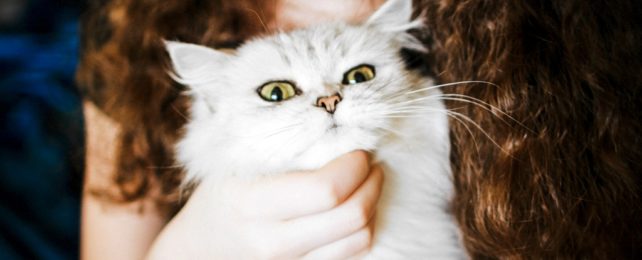A new study reveals that people who consider themselves knowledgeable and experienced cat parents may in fact be giving their felines too much affection – or at least not putting it across in the best way.
Previous research has helped to establish how cats should be handled to put them at ease, or at least less hostile and perhaps a bit more affectionate. This includes areas of the body where the animals like to be petted, and how and when they prefer to be picked up.
Based on the findings of the new research, self-confessed 'cat people' tend to pet the animals in areas that they aren't so comfortable with, and give the felines less choice over how they are handled.
"Of course, every cat is an individual and many will have specific preferences for how they prefer to be interacted with," says Lauren Finka, a researcher in animal behavior and welfare at Nottingham Trent University in the UK.
"However, there are also some good general principles to follow in order to ensure every cat is as comfortable as possible and that their specific needs are being met."
The study involved roughly 120 volunteers who were given five minutes each in Battersea Dogs and Cats Home with three cats they didn't know. Each volunteer was asked to fill out a survey in advance, assessing their personality and experience with cats.
Apart from being told to let the cats approach them, rather than follow the animals around, those involved in the experiment were encouraged to interact with the felines as they normally would with cats they might have at home.
The researchers found that people who rated themselves as more experienced and savvy with cats were more likely to touch the animals on the base of the tail, legs, back and tummy – areas where cats typically don't like to be petted (they usually prefer the ears, the cheeks, and under the chin).
What's more, participants who reported having more cats at home and who have had cats for longer were less likely to give cats as much control and freedom during interactions as they really should have.
"Our findings suggest that certain characteristics we might assume would make someone good at interacting with cats – how knowledgeable they say they are, their cat ownership experiences and being older – should not always be considered as reliable indicators of a person's suitability to adopt certain cats, particularly those with specific handling or behavioral needs," says Finka.
When it comes to people's age and personality types, those who were older and who ranked higher for neuroticism were the volunteers more likely to hold and restrain the cats more, while extroverts tended to initiate contact more often and pet the less preferred areas of the cats' bodies.
On the other hand, people who ranked higher for agreeableness were less likely to touch the more sensitive areas of the cats. Additionally, those who reported having formal experience working with cats were shown to be more 'cat friendly' in terms of being sensitive to the wishes of the animals.
The thinking behind the study is not to shame anyone because of the way they handle cats, but to encourage interactions that are beneficial to felines, by experienced and new cat owners alike. Battersea has put together an animation on the topic of cat care which you can see here.
There are also implications for finding new homes for cats – and the message is that people who are new to befriending cats can learn to be equally good carers as those who have years of experience.
"Importantly, within shelters, we should also avoid discriminating against potential adopters with no previous cat ownership experience, because with the right support, they may make fantastic cat guardians," says Finka.
The research has been published in Scientific Reports.
